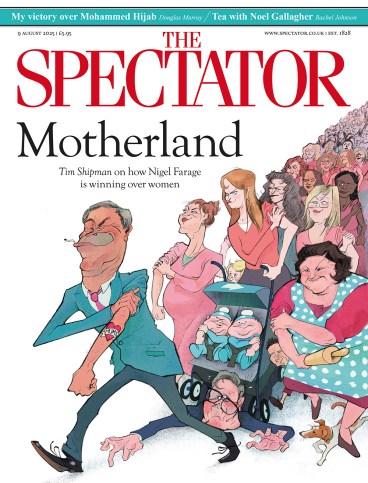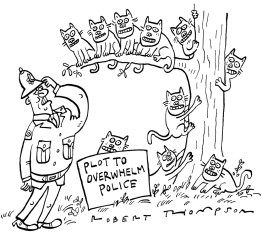
One of the occupational hazards of being a journalist is being hounded by litigants. Indeed, one of the reasons why much of the media finds it easier to report fluff than to write about difficult issues is that the latter can be costly in terms of money, as well as time.
Three years ago I wrote a column in this magazine about some of the downsides of diversity. At the time there had just been serious disturbances in Leicester between local Hindus and Muslims. One of the people who decided to throw himself into the middle of that trouble and to try to make things worse was an online pugilist known as Mohammed Hijab.
Hijab had already been filmed intimidating Jews in Golders Green and whipping up a crowd of masked men outside the Israeli embassy in London. In Leicester he chose to make a derogatory speech about Hindus to a crowd of men and then picture himself leading a ‘Muslim patrol’ in the city.
After I pointed this out, Hijab tried to sue me and The Spectator. I retained the excellent Mark Lewis as my lawyer and for years, along with the magazine’s brilliant legal team RPC, we watched Hijab perform every known legal and rhetorical contortion. Hijab’s lawyers repeatedly dragged out their case, avoided every opportunity to drop it and insisted not only that what I had written was untrue, but that Hijab had suffered serious emotional and mental distress, as well as financial loss, as a result. Hijab seemed to think that he could use the courts not just to pursue me but to debate me.
Last month the case was heard in London before Mr Justice Johnson. Many of Hijab’s witnesses failed to show up, claiming ill health or having appeared to have skipped the country. Hijab himself spent several days in the witness box.
This week the judge delivered his verdict. Mr Justice Johnson found that what I had said in my article was accurate, that Hijab had hurt his own reputation more through his actions and social media posts than I could ever have done with my article, and that the number of lies Hijab told in court were so numerous that his ‘evidence overall is worthless’. The judgment also noted that as well as being ‘combative and constantly argumentative’ when cross-examined by my barrister and The Spectator’s barrister, Hijab also demonstrated a ‘palpable personal animosity’ towards your columnist.
He seemed proud of trying to bully the press, as well as the courts. But he could not stop himself from lying
The judgment found that Hijab lied about events in Golders Green – which he refused to accept was a Jewish area. It found that he had lied about his demagogic and dangerous actions outside the Israeli embassy in London, that he had lied about events in Leicester, and that he had lied about – and indeed appeared to have concocted – his claim of lost earnings. These lost earnings were alleged to have come from three Muslim organisations, including a supplements company called Nature’s Blends. All claimed to have been big readers of my Spectator column, as indeed, Hijab alleged – causing him yet more hurt – was a receptionist at his local gym. Witnesses to his alleged financial loss failed to attend court. Another – Mr Wasway from Nature’s Blends – had to try to explain his recent conviction and time spent in prison for making false court claims after staging car accidents.
Not many law case reports make good reading in their own right, but this one does. No doubt Hijab will bluster that the findings are unfair and anti-Islamic – just as he tried to claim in court that Tommy Robinson, Benjamin Netanyahu and myself are three examples of non-Hindu Hindu extremists. But the judge in the case said far more against Hijab than I ever did.

In court Hijab boasted of having sued other publications. He seemed proud of trying to bully the press, as well as the courts. But time and again he could not stop himself from lying. He claimed that his demagogic street speeches were attempts to publicly debate ‘theology’ and ‘eschatology’. The judge found they were no such thing. Hijab had gone to Jewish areas on the Sabbath and a Hindu area during a volatile moment to engage in a type of vigilantism. As the judge said, Hijab ‘was deliberately acting irresponsibly, raising the temperature of a volatile and potentially dangerous situation with provocative and inflammatory language’. The judge found his denials of vigilantism to be ‘self-defeating’ and ‘untenable’.
In summary, the judge found that ‘the claimant is a street agitator who has whipped up a mob on London’s streets, addressed an anti-Israel protest in inflammatory terms, and exacerbated frayed tensions (which had already spilled over into public disorder) between Muslim and Hindu communities in Leicester by whipping up his Muslim followers including by ridiculing Hindus for their belief in reincarnation and describing Hindus as pathetic, weak and cowardly in comparison to whom he would rather be an animal’. The judge ruled that what I wrote three years ago was true and Hijab was a liar.
What to conclude about all this? Only that the press in this country often has to put up with Hijab-like figures. Few readers will be aware of the fact that one of the perils of an otherwise wonderful profession is litigious individuals attempting to silence the press from saying things about them that are true. Indeed I know journalists who in recent years have had to spend more time dealing with their lawyers than dealing with their editors. It is inevitable that over time many editors, publications and journalists will decide to take an easier route.
Hijab imagined he could use the court system to intimidate me and this magazine. He resolutely and comprehensively failed. It turned out that a London courtroom and a British judge are not X, YouTube or some other online echo-chamber. The court is a place where facts are able to come out and where lies can come out too. I am very proud that The Spectator stood up against this thug and bully, and that a judge has exposed him for everyone to see.







